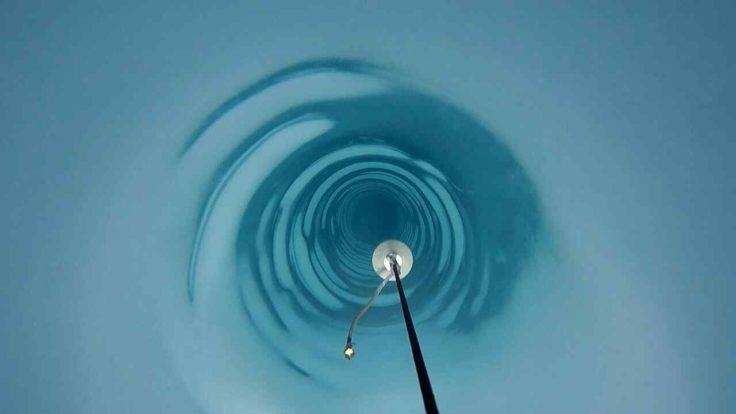
Scientists drill to record depths in West Antarctica
by British Antarctic Survey 27 Jan 2019 07:30 UTC

The BEAMISH team has drilled over two kilometres to the base of the Rutford Ice Stream in West Antarctica © British Antarctic Survey
A team of scientists and engineers has for the first time successfully drilled over two kilometres through the ice sheet in West Antarctica using hot water. This research will help understand how the region will respond to a warming climate.
The 11-person team has been working on the Rutford Ice Stream for the last 12 weeks in freezing temperatures at low as minus 30 degrees Celsius. On Tuesday 8 January, following a 63 hour continuous round-the-clock drilling operation, the team broke through to the sediment 2152 metres below the surface.
A string of instruments were fed through the borehole which will record water pressure, ice temperature and deformation within the ice around it.
The project, which is named BEAMISH, has been 20 years in the planning, and was attempted in 2004 without success.
Lead scientist Dr Andy Smith from British Antarctic Survey (BAS), who is still working on the Rutford Ice Stream, says:
"I have waited for this moment for a long time and am delighted that we've finally achieved our goal. There are gaps in our knowledge of what's happening in West Antarctica and by studying the area where the ice sits on soft sediment we can understand better how this region may change in the future and contribute to global sea-level rise."
The team has now drilled two holes (with the second completed on 22 January) and plan to be working on the ice until mid-February 2018. Further work will now continue at a second site a few kilometres away.
Dr Keith Makinson, a physical oceanographer at BAS, says:
"We know that warmer ocean waters are eroding many of West Antarctica's glaciers. What we're trying to understand is how slippery the sediment underneath these glaciers is, and therefore how quickly they might flow off the continent into the sea. This will help us determine future sea level rise from West Antarctica with more certainty."
The BEAMISH projects aims to improve future predictions of West Antarctica through a better understanding of ice flow and ice sheet history. The project is led by BAS and has collaborations with the universities of Swansea, Bristol, UCL and Leeds, and with Pennsylvania State University and the US National Science Foundation.
You can follow the team live from the field on twitter.com/HotWaterOnIce
This article has been provided by the courtesy of the British Antarctic Survey.